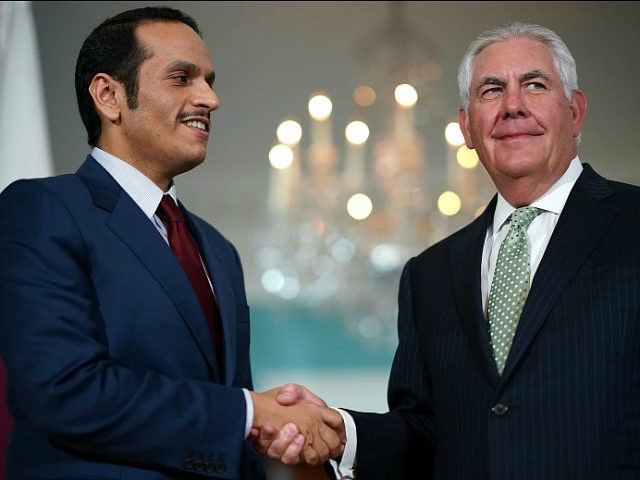Following a meeting with U.S. Secretary of State Rex Tillerson, Qatar’s Foreign Minister Sheikh Mohammed bin Abdulrahman al-Thani issued a statement calling Saudi Arabia’s demands on his country “unreasonable” and “false.”
“We do not support terrorism, we do not interfere in the internal affairs of our neighbors, and we are not secret allies of Iran,” al-Thani insisted. His statement concisely summed up the major complaints leveled by Saudi Arabia, Egypt, the United Arab Emirates, and other Sunni Arab nations that have been effectively blockading Qatar for the past three weeks.
The coalition against Qatar presented the embattled emirate with a list of 13 sweeping demands last week, among them cutting ties with Iran, terminating support for dissident and insurgent movies in neighboring states, and shutting down the Al-Jazeera television network. On Tuesday, Saudi Arabia stressed that these demands are non-negotiable.
The Qatari Foreign Ministry stated that, during his talks with Tillerson, al-Thani “insisted that others must be genuinely willing to negotiate and to present evidence to support their allegations and demands.”
Curiously, as CNBC notes, the State Department did not post its own statement on the Tillerson meeting with al-Thani as it generally does with such high-level meetings over major world events.
The State Department did publish a statement about Tillerson’s meeting with Kuwaiti Minister of State for Cabinet Affairs Sheikh Mohammad Abdullah al-Sabah on Tuesday, saying that both leaders “reaffirmed the need for all parties to exercise restraint to allow for productive diplomatic discussions.” Kuwait has been acting as an intermediary between Qatar and its accusers.
Both in this formal statement and a very brief press conference afterward, Tillerson expressed hope that Qatar and all other parties to the dispute would “remain open to negotiation as the best way to resolve the dispute” and “continue to talk to one another in good faith.”
So far, there has not been much “good faith” to continue. After meeting with Tillerson, Qatari Foreign Minister al-Thani spoke from Washington and blasted Saudi Arabia for failing to negotiate.
“This is contrary to the principles that govern international relations because you can’t just present lists of demands and refuse to negotiate,” said al-Thani.
While Tillerson has expressed support for Kuwait’s attempt to moderate the crisis, Hussein Ibish of the Arab Gulf States Institute in Washington told France24 that only American intervention could resolve the “all-out struggle of wills.”
“The way out for both sides is a kind of an American mediation which is face-saving for everybody,” said Ibish.
The problem is that no official American consensus about what “mediation” should look like exists. Much has been made of the distance between President Trump’s enthusiastic support for the Saudi position and Tillerson’s preference for a speedy negotiated end to the embargo. The opposite end of the spectrum is better seen in Senate Foreign Relations Chairman Bob Coker’s (R-TN) threat to block U.S. arms sales to Gulf Cooperation Council countries unless they back off Qatar.
There is also the uneasy question of Qatar’s outsized influence over the U.S. foreign policy establishment, explored in depth by Angelo Codevilla of the Security Studies Group in a June 23 post titled “For Years, Qatar Has Been Corrupting the National Security Deep State.”
Coevilla argues that Qatar’s years of financial support for various U.S. policy shops and educational institutions have given it enough influence to block such initiatives as designating the Muslim Brotherhood a terrorist organization, which makes the support of some American politicians and opinion-shapers for Qatar in the current crisis suspect.
“Suffice it to say that ideas friendly to Qatari causes have no difficulty being heard in high places and that, hence, those who make U.S policy naturally regard the persons who express them as authoritative,” he summarizes.

COMMENTS
Please let us know if you're having issues with commenting.